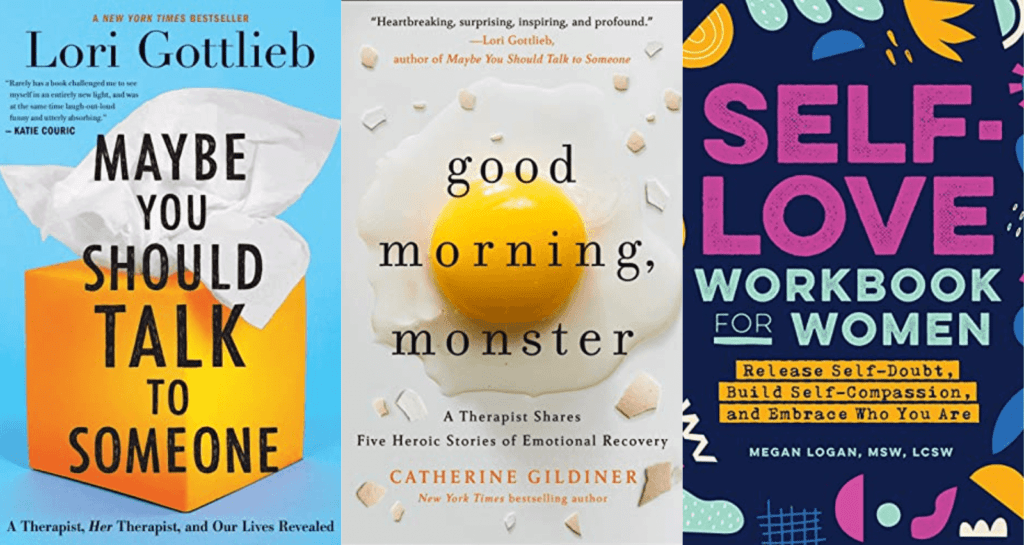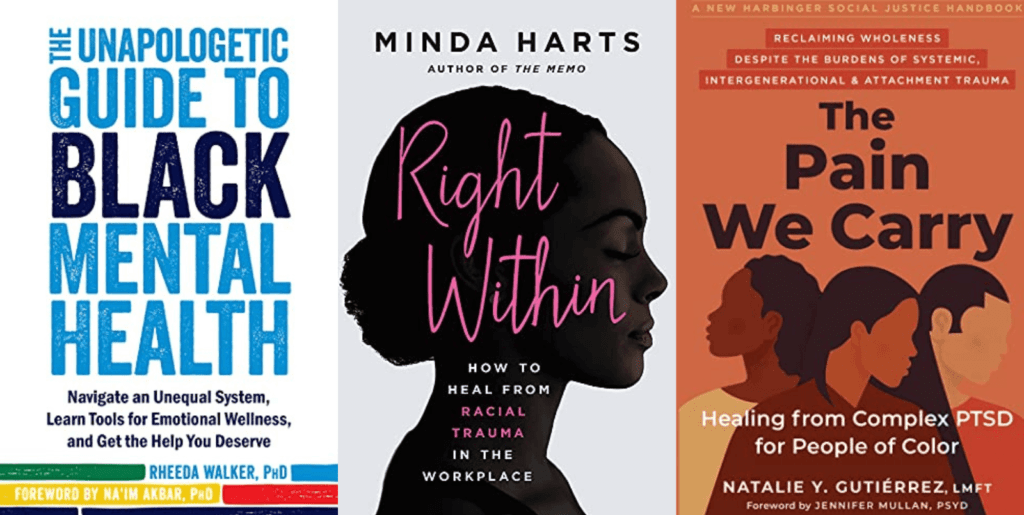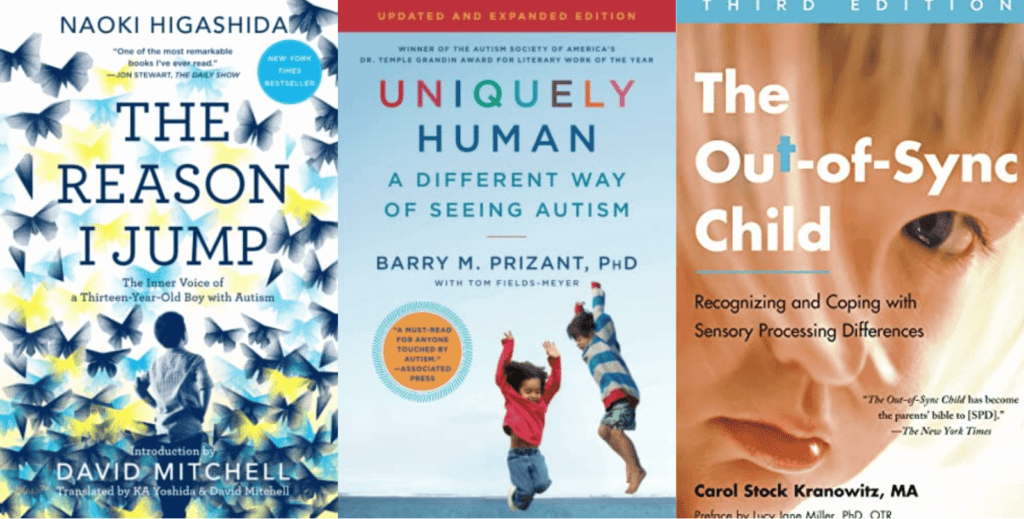The following are some of the best nonfiction books about mental health to help you embark on your recovery journey.
Disclosure: Some of the links below are affiliate links. This means that, at zero cost to you, I will earn an affiliate commission if you click through the link and finalize a purchase.
Nonfiction Books About Mental Health

1. Maybe You Should Talk To Someone
By Lori Gottlieb
With startling wisdom and humor, Gottlieb invites us into her world as both clinician and patient, examining the truths and fictions we tell ourselves and others as we teeter on the tightrope between love and desire, meaning and mortality, guilt and redemption, terror and courage, hope and change.
Maybe You Should Talk to Someone is revolutionary in its candor, offering a deeply personal yet universal tour of our hearts and minds and providing the rarest of gifts: a boldly revealing portrait of what it means to be human, and a disarmingly funny and illuminating account of our own mysterious lives and our power to transform them.
Related: Best 99 Coping Skills (+FREE Coping Worksheets)

2. Good Morning, Monster
By Catherine Gildiner
In this fascinating narrative, therapist Catherine Gildiner’s presents five of what she calls her most heroic and memorable patients.
Gildiner’s account of her journeys with them is moving, insightful, and sometimes very funny. Good Morning Monster offers an almost novelistic, behind-the-scenes look into the therapist’s office, illustrating how the process can heal even the most unimaginable wounds.
Related: How To Feel Your Feelings? Top 9 Difficult Emotions To Cope With In Healthy Ways

3. Emotional First Aid
By Guy Winch Ph.D.
We all sustain emotional wounds. Failure, guilt, rejection, and loss are as much a part of life as the occasional scraped elbow.
Drawing on the latest scientific research and using real-life examples, practicing psychologist Guy Winch, Ph.D. offers specific step-by-step treatments that are fast, simple, and effective.
Related: Top +100 Journal Prompts For Mental Health [+Free PDF Printable!]

4. Unfuck Your Brain
By Faith Harper
With humor, patience, science, and lots of good-ole swearing, Dr. Faith explains what’s going on in your skull, and talks you through the process of retraining your brain to respond appropriately to the non-emergencies of everyday life, and to deal effectively with old, or newly acquired, traumas (particularly post-traumatic stress disorder).
Related: Top 21 Healing Journal Prompts To Support Your Healing Journey

5. Stop Overthinking
By Nick Trenton
Stop Overthinking is a book that understands where you’ve been through,the exhausting situation you’ve put yourself into, and how you lose your mind in the trap of anxiety and stress. Acclaimed author Nick Trenton will walk you through the obstacles with detailed and proven techniques to help you rewire your brain, control your thoughts, and change your mental habits.What’s more, the book will provide you scientific approaches to completely change the way you think and feel about yourself by ending the vicious thought patterns.
Related: Why Is Trauma Therapy So Hard? (+Best Trauma Healing Exercises To Support Your Recovery)

6. Self-Love Workbook for Women
By Megan Logan MSW LCSW
What sets this self-care journal and workbook apart from other self-love workbooks for women:
- Proven techniques—Fall in love with yourself using a variety of compassionate exercises rooted in mindfulness and positive psychology.
- Inspiring prompts and motivating activities—Explore all that you are with quizzes and journaling exercises that will help you tap into your emotions and let go of limiting beliefs. Includes writing space for reflection and introspection.
- Empowering affirmations—Boost your positivity and nurture yourself using the uplifting affirmations interspersed throughout the book.
Related: How To Be Gentle With Yourself? Top 5 Ways To Practice Self-Compassion

7. 52-Week Mental Health Journal
By Cynthia Catchings LCSW-S LCSW-C MSSW
This yearlong mental health journal includes:
- Quick and effective prompts―Take just a few minutes each day to reduce stress, increase your connection to others, and find deeper meaning in your life.
- Evidence-based methods―The exercises in this mental health journal are rooted in research-supported techniques like mindfulness and cognitive behavioral therapy.
- Inspiring quotes―Find wisdom and motivation with poignant words from philosophers, artists, writers, and more.
Related: Top 9 Sustainable Self Care Products

8. My Therapist Told Me to Journal
By Holly Chisholm
The author HATES journaling. This is the journal she wishes she had had when first starting out in therapy.
From the creator of Just Peachy Comics, this interactive self-care book uses journaling, drawing, and goal-tracking to help improve the user’s overall mental health and well-being. The journal will introduce you to a variety of therapy practices such as CBT (Cognitive behavioral therapy) and EMDR. It will also illustrate the author’s “dot method” of goal tracking to help reduce anxiety.
Related: Top 45 Self Care Day Ideas at Home To Kickstart Your Self Care Ritual

9. Maybe You Should Talk to Someone – The Journal
By Lori Gottlieb
In Maybe You Should Talk to Someone, Lori Gottlieb gave us a brilliant behind the scenes look at a therapist doing everything to help her patients—and herself. Now, in this gorgeous guided journal, you can put Gottlieb’s compelling ideas into practice in your own life. Structured as a weekly therapy session, the journal takes you through 52 thought-provoking prompts to consider over the course of seven days–just like the time between sessions–opening the possibility for meaningful growth and reflection.
Related: How To Start A Self Love Journey? Top 10 Powerful Ways to Love Yourself More

How Nonfiction Books About Mental Health Can Help
Nonfiction books about mental health can be incredibly beneficial in many ways. Here are a few ways they can help:
1. Education and Awareness: Nonfiction books provide valuable information about mental health conditions, symptoms, causes, and treatments. They help increase understanding and awareness of various mental health issues, reducing the stigma that often surrounds them.
2. Personal Empowerment: Reading nonfiction books on mental health can empower individuals by giving them knowledge and tools to better understand their own mental well-being. It can equip them with strategies and techniques to manage challenges and improve their overall mental health.
3. Validation and Connection: Mental health books often include personal stories and experiences, providing readers with a sense of validation and reminding them that they are not alone in their struggles. This connection can be comforting and reassuring for individuals, especially if they have felt isolated or misunderstood.
4. Self-Help and Coping Strategies: Many nonfiction books on mental health offer practical advice, self-help exercises, and coping strategies. These tools can aid individuals in developing healthy coping mechanisms, managing stress, improving relationships, and enhancing their overall well-being.
5. Understanding Others: Nonfiction books can also help individuals better understand the experiences of others with mental health conditions. This increased empathy and understanding can foster more supportive and compassionate attitudes towards individuals living with mental health challenges.
6. Professional Guidance: Some nonfiction books are written by mental health professionals, sharing their expertise and evidence-based approaches. While books are not a substitute for professional help, they can serve as a valuable resource and complement therapeutic interventions.
7. Building Resilience: Reading about other people’s journeys of resilience and recovery can inspire hope and encourage individuals to develop their own resilience. Nonfiction books often highlight stories of individuals who have overcome immense challenges, demonstrating that recovery and growth are possible.
Conclusion
While nonfiction books on mental health can be beneficial, it is important to seek professional help when needed.
Books should be used as a supplement to, not a replacement for, guidance from mental health professionals.



